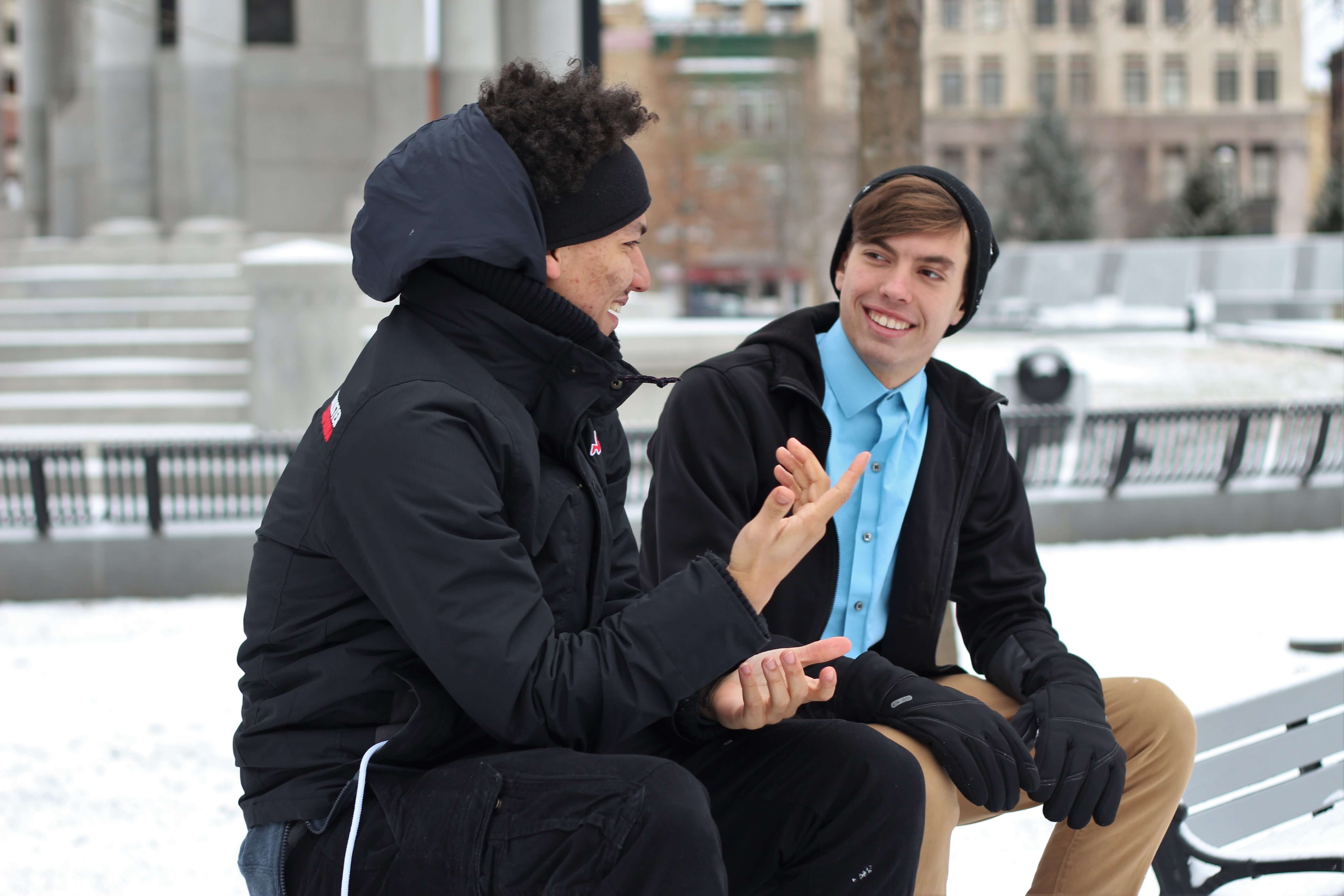Our words have power. This is especially true when choosing what to say when we have a friend or loved one who may be in an unhealthy relationship. If you suspect that your friend or family member is in an unhealthy relationship, it’s natural and right to express your concern. Yet when we are very close to someone, we may be tempted to say things differently than if we are not as close to them, or we may approach a situation without a real understanding of what they are going through or thinking. Have you felt yourself wondering what to say, how to say it, and when? How can you use your words to empower a friend who may need your support? Here are a few tips and comments from people who have experienced relationship abuse that may be helpful:
Tip #1 Listen Without Inserting Your Opinion

“Above all listen…your friend will value your opinion more if they feel heard and that you understand the bigger picture…take time to digest what they’ve told you and really consider it from their perspective so you can approach them in a meaningful way.” -CM
By taking the time to listen, you are communicating to your friend that their feelings and thoughts about their relationship are valid. The goal should be to support your friend, not to dictate what they should do or to insert your personal opinion about their relationship or their partner. When it is your turn to respond, tone is everything – it’s important to not be critical or sound judgmental. You can be a better support to your friend by asking open-ended questions.
- Instead of asking –“Do you seriously need to have his or her permission to hang out?”
- Try asking more open-ended questions such as: “How would you feel if you witnessed my boyfriend or girlfriend treating me like that?”
The goal is to create a safe space for your friend to express themselves honestly without fear of being judged.
Tip #2 Avoid criticizing your friend for staying in a relationship, instead express your concern for your friend

“I was in a period where I wasn’t telling anyone how bad things really were… (but) I took note of the people who…told me I was an idiot for staying in a relationship, and (those) who expressed concern without putting a lot of pressure on me…when I was ready to talk, those are the people I went to– the people who hadn’t made me feel judged.” -AP
It’s understandable to feel that if your friend trusts your opinion, they will respect you if you confront them or simply tell them that they need to leave their partner. However, instead of empowering your friend, this approach can actually have the opposite effect and your friend might distance themselves from you even further, spending more time with their abusive partner. As AP went on to say, “I had friends who gave commands and told me to leave…but I didn’t know how…so that wasn’t as helpful to me…” When approaching a similar situation try this:
- Instead of saying: “You need to leave that loser!”
- Try asking: “Is there a reason you are staying with him or her?” or “I’ve noticed you haven’t really been yourself lately and I’m concerned. If there is something you need to talk about, I’m here to talk.”
Offer specific times to talk with your friend, maybe set up a time to meet for a bite to eat, a latte, or after class. Your goal here is to establish that you care about your friend and that you are available, regardless of their relationship status.
Tip #3 Validate your Friend’s Feelings and Focus on the Behaviors

“…Remember that they love the person abusing them. They wouldn’t be there if they didn’t, so let them know you’re there for them and will love them through this.” -CM
Your friend may be experiencing a range of feelings. Being abused by someone that they love can leave them feeling scared and confused. In between those moments of fear, there are good moments when their partner can be particularly charming and romantic. It’s important to acknowledge and validate that those feelings are normal and to not shut them down, as if they don’t have a place or merit.
- Instead of asking: “He is such a jerk, how could you be with someone like that?” or “How can you be so blind?”
- Try starting off your question like this: “I know you love him (or her) but I’m concerned about (mention specific behavior). How does that make you feel?”
By approaching your friend in this way, you will avoid demonizing the abusive partner and help your friend realize that you’re not ignoring their feelings. If you focus the conversation on their abusive partner, it will likely make your friend feel defensive because they do have genuine feelings for that person and it’s hard to hear negative comments about anyone we love. Instead, if you focus on specific behaviors that may be unhealthy, you can help them come to their own conclusions as to whether they need to leave their relationship or not.
Tip #4 Focus on your friend’s good traits

“…Tell them your favorite things about them.” -AP
Your friend may find themselves in a relationship with someone who has torn down their self-esteem, so make it a point to tell your friend what you admire about them! For example, instead of questioning their judgment for staying in a relationship you can try to remind them of their amazing qualities.
Instead of saying: “He treats you really bad, why are you still with him.”
Try saying: “You are great friend, I can always count on you.” or, “You are so smart and funny, I always enjoy when we hang out.”
By making it a point to highlight your friend’s positive traits, you can help remind them of their worth. Ultimately, you want them to be with someone who truly appreciates and admires them as much, or even more than you do.
Tip #5 Be Patient and Supportive

“If you think that your friend is in an unhealthy relationship, a good place to start is reminding them that you love them. Work hard to establish that…they will see what they need to see when they’re ready to see it, and you can’t do that work for them or drag them through it in ten seconds…”-AP
This may be easier said than done, but it’s important to have this ongoing conversation at your friend’s pace not your own. It may take a while before they recognize the abuse in their relationship, or are ready to leave. The key here is to confirm your love and support for your friend.
- Instead of saying: “I’m done talking about this.”
- Try saying: “I am here for you, whatever it is. If you ever need to talk, I’m here to listen.”
The words we choose have an impact. Look for ways to empower and support your friend – they may not remember every word that you say, but they will remember how your words made them feel. While these suggestions may be helpful for some, everyone’s scenario is different, so keep that in mind as you talk to your friend. Ultimately, you want to be the person your friend can turn to when they are ready.
Are you ready to learn more about healthy relationships? We’ve got you covered. Check out our blog for the latest tips on having a healthier and happier relationship.
Browse by Category

Don’t Be on the Naughty List: Spotting Unhealthy Relationship Signs This Holiday Season
The holidays are meant for joy, connection, and celebration—whether it’s Christmas, Hanukkah, Kwanzaa, or cozy winter vibes. But if someone…
How to Have Healthy Holiday Conversations with Family (and Prep Your Partner)
The holidays are a time for family, good food, and—let's…
3.2 Million Strong: How One Love is Saving Lives Through Education
Please share this blog with your network across social media,…
Finding Strength in Our Stories: Domestic Violence Awareness Month
⚠️ Trigger Warning: This blog includes content and language related…
Understanding Domestic Violence Awareness Month (DVAM)
October is almost here, and that means it’s time to…














